
Free software exists because people create it, and want to share. Why do people create their own software? Quite often, its to “scratch an itch”… if the software you need doesn’t exist, sometimes you have to make it yourself.
One of the cool things is that the free software community is really community. People who know are almost always willing to help people who are just learning.
In my geographic locality of Waterloo Region there is a monthly Ubuntu Hour in both Kitchener and Waterloo. These meetings, held in a local coffee shop or restaurant, help form free software communities, and allowing new free software users to connect with more experienced users.
The local Linux User Group has monthly presentation meetings to explain various software/hardware (I am actually writing this at the Kitchener Waterloo Linux User Group (or KWLUG) meeting where someone from the local KWARTZlab makerspace is showing off a Raspberry Pi computer.)
It’s also possible to find like minded groups throughout the world with the MeetUp web site.
Not everyone is equipped to write their own software.
I myself am nowhere near writing my own software, but I have been learning to fiddle with things so that I can get closer to achieving what I want to achieve. Before being brave enough to even contemplate such a thing, most of us might set up our own Facebook page.
You may have spent some time finding the right blog theme (or template) that most closely sets up your blog so it is laid out the way you want it to be.
When I first started making my first web page, the most amazing tool for me was the online HTMLdog online tutorials, which is still my main resource for XHTML and CSS.
For JavaScript there is something called Code Academy.
If there is software that you want to learn to use, or even just how to do a tiny fix, particularly for open source or free software, chances are there is some online tutorial, perhaps even video tutorials, to show you how.
If you’re on a social network, like Identi.ca, Friendica, Diaspora, Twitter, reddit, or even google+, you can often find the answers you need. Addressing a query to “lazyweb” on Twitter will often turn up the answer you need.
And of course, you can always try typing your question into the search bar of your favourite Search Engine (my favourites are DuckDuckGo and ixQuick

